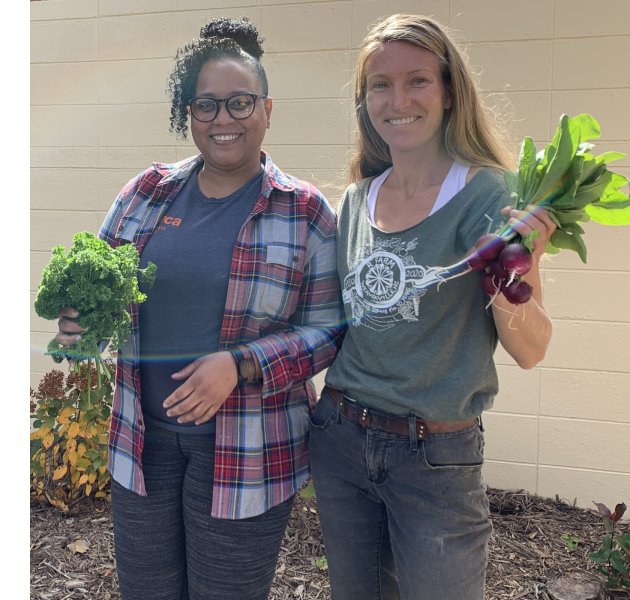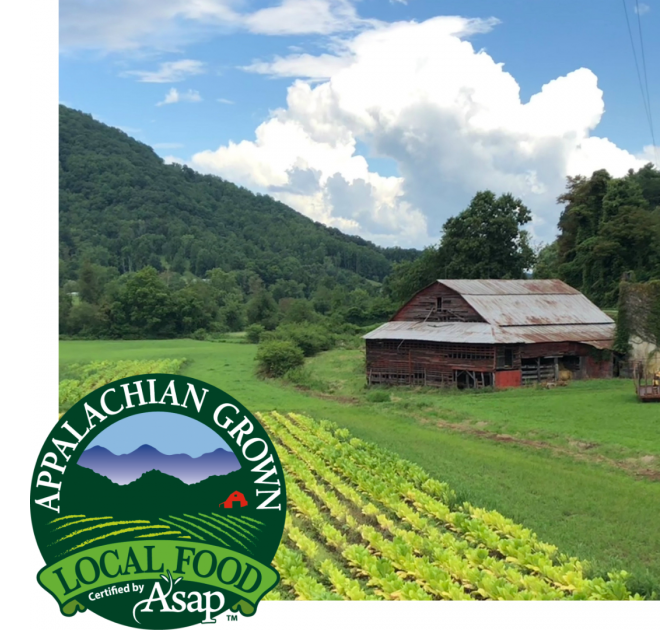|
|
|
monthly news from ASAP | DECEMBER 2023 | asapconnections.org
|
| |
|
|
ASAP and Partners Form the WNC Double SNAP Network
|
|
Beginning in January, ASAP will partner with Blue Ridge Women in Agriculture and MountainWise to expand Double SNAP for Fruits and Vegetables programs to more farmers markets, farmstands, and groceries in Western North Carolina. This group has established the WNC Double SNAP Network in order to bring together existing programs and expand to new sites, making SNAP incentives more accessible throughout the region.The first phase of the project focuses on strengthening existing programs across sites operating January through March. See the full list here.
ASAP, MountainWise, and Blue Ridge Women in Agriculture currently operate SNAP incentive programs at 26 sites. By partnering, the network will be able to not only deepen the impact of existing programs, but create adaptive programs that meet the needs of communities that don’t currently have access. SNAP programs that center local food and farms can significantly improve individual and community health. They make fresh fruits and vegetables more accessible, keep food dollars in the local economy, and connect participants with positive food and social environments in their communities.
This partnership and program expansion is made possible in part by funding from the USDA National Institute of Food and Agriculture’s Gus Schumacher Nutrition Incentive Program. ASAP, as the lead organization, is one of 19 awardees across the country that received funding for nutrition incentive programs, which increase the purchase of fruits and vegetables by providing incentives for income-eligible households participating in SNAP. Additional support comes from the project partners as well as Alleghany Wellness Coalition, Dogwood Health Trust, MANNA Food Bank, Walnut Cove Members Association, and other private foundations and donors. |
|
 |
Workshops Announced for the Business of Farming Conference
|
Workshops for the Business of Farming Conference (Feb. 24 at A-B Tech Conference Center in Asheville) are designed to help guide aspiring and seasoned farmers through a variety of questions and challenges. More than a dozen workshops have been announced for the 2024 conference.
Returning workshops include popular topics such as Farm Financials and Recordkeeping and Resources for New and Beginning Farmers. Among several new sessions for 2024 are Alternate Capital: Grants and Fundraising for Farmers and Planning for Retirement. Find a full list of workshop descriptions here.
Register for the conference by Feb. 1 to get discounted early-bird prices. Scholarships are available for limited-resource and BIPOC farmers, as well as discounts for farm partners registering together.
|
|
 |
 Meet Jessica Ruiz, ASAP's new Community Research Coordinator! Meet Jessica Ruiz, ASAP's new Community Research Coordinator!
Originally from Greenville, NC, Jessica completed her Master's in Anthropology from East Carolina University. Her thesis work investigating culture and health decisions introduced her to the research world. After conducting interviews with farmers while on a study abroad trip to the Andean Highlands of Peru, she decided to further investigate the intersection of agriculture and research.
Jessica will engage with diverse community members and organizations to understand changes in the local food system, barriers to participation, and the impact of ASAP's work.
|
|
 |
Input Needed: Farmers and Childcare Providers
|
 The NC Farm to Preschool Network—in partnership with the Division of Public Health, Division of Child and Family Well-Being, Community Nutrition Services Section, and Child and Adult Care Food Program—is exploring the creation of an interactive statewide mapping system to connect early care and education (ECE) providers and farmers for easier purchasing or selling of local foods. The NC Farm to Preschool Network—in partnership with the Division of Public Health, Division of Child and Family Well-Being, Community Nutrition Services Section, and Child and Adult Care Food Program—is exploring the creation of an interactive statewide mapping system to connect early care and education (ECE) providers and farmers for easier purchasing or selling of local foods.
This North Carolina statewide mapping system would be county specific and show ECE providers and farmers in each county. The goal is for this map to be a valuable tool in promoting the use of local foods and building healthier communities across North Carolina. We are currently in the surveying stage where we would like to assess the opinions of childcare providers and farmers. Please share your opinions by completing this short survey.
|
|
 |
 FACES OF LOCAL FACES OF LOCAL |
| Appalachian Grown Farmers
|
|  Every year our Local Food Research Center team surveys the farmers in our Appalachian Grown network in order to take the pulse of farming in our region and assess the impact of ASAP's programs and services. The the full report of our 2023 survey will be available next year, but for our Faces of Local feature this month, we're sharing some of our favorite responses so far. These reflections are inspiring us as we move into the new year! Every year our Local Food Research Center team surveys the farmers in our Appalachian Grown network in order to take the pulse of farming in our region and assess the impact of ASAP's programs and services. The the full report of our 2023 survey will be available next year, but for our Faces of Local feature this month, we're sharing some of our favorite responses so far. These reflections are inspiring us as we move into the new year!
Note: The 2023 survey closes at the end of the day tomorrow (Friday)! If you are a farmer or producer and still want to fill it out, look for the survey link from [email protected] in your email.
"We were happy to be invited and participate in local farmers markets which have been great spaces to connect with other local farmers, producers and clients. We feel more known and valued by the whole community."
“We saw many new faces and sales at [tailgate markets] in 2023. We attribute the new customers to ASAP's Farm Fresh Bucks and the diverse families and individuals the program supports. We love the program for so many reasons—more shoppers at our already established sales venues means we have less waste on our farm; selling to a diverse population gives our work meaning; and increased sales means that we can pay our staff and ourselves more of a livable wage. These are all difficult things to achieve in farming, and we are so grateful that ASAP's Double SNAP and prescription programs have so effectively done it.”
“Seeing success stories of other industry leaders achieving their goals is inspiring. It shows me that others have gone before me and turned nothing into something great for themselves and the community.”
“The partnership we have with our food pantry has been a constant source of inspiration and joy for everyone on our farm. Being able to collaborate with an organization one mile from our fields to bring fresh produce to families in need gives our farm team a deep sense of meaning and also provides us with community connections. This is vitally important for local farmers. With the rapid loss of the farming culture here in WNC, creating authentic community connections for farmers will be key to keep them on their land.”
“Knowing that the work we do goes beyond just providing a paycheck for us and our employees. It nourishes our community and brings back a balance to our ecosystem that has been lost due to hundreds of years of hard farming.”
"Every year, since the inception of my farm, ASAP has found a way to support me as my business grows and evolves. I'm grateful to everyone at ASAP for the work they do to advocate for farmers."
|
|
|
|
 RECIPE OF THE MONTH RECIPE OF THE MONTH |
|
Kale-Sausage Breakfast Strata
|
|  For a easy and cozy morning meal assemble the day before, you can’t go wrong with a strata! Akin to a savory bread pudding, strata combines milk, eggs, cheese, bread, plus a combination of meat and vegetables. This recipe includes local kale and sausage, but feel free to get creative! For a easy and cozy morning meal assemble the day before, you can’t go wrong with a strata! Akin to a savory bread pudding, strata combines milk, eggs, cheese, bread, plus a combination of meat and vegetables. This recipe includes local kale and sausage, but feel free to get creative!
Serves 8
Ingredients
- 1 large bunch local kale (lacinato or curly types will work!)
- 1 tablespoon olive oil, plus more as needed
- 1/2 pound local Italian sausage (or 2 links, casings removed)
- 1 yellow onion, diced
- 1 teaspoon minced rosemary
- 5 cups day-old sourdough bread, cut into 1-inch cubes (about 1/2 pound)
- 1 cup grated or crumbled cheese (such as Gruyère, cheddar, or fresh goat)
- 1/3 cup grated Parmesan
- 8 eggs
- 2 1/2 cups milk
- 3/4 cup heavy cream
- 1 teaspoon kosher salt
- Freshly cracked black pepper
Directions
- Butter a 3-quart baking dish and set aside.
- Strip the kale leaves from the stems and tear leaves. Bring a large pot of salted water to the boil. Add the kale and cook until just tender, about 6 to 7 minutes. Remove kale and run under cold water to cool. When cool enough to handle, gently squeeze out the excess water. Chop very coarsely and set aside.
- While the kale cooks, heat a tablespoon of olive oil in a large sauté pan over medium heat. Crumble in the sausage and cook, stirring occasionally, until cooked through, about 8 to 10 minutes. Using a slotted spoon, lift out the sausage and transfer to a plate.
- Return the pan to medium heat. Add the onion and rosemary along with a good pinch of salt. Sweat, stirring occasionally, until the onion is translucent. Add the kale and toss to combine with onions. Cook for a minute or two to allow the flavors to blend. Set aside to cool.
- Place the bread, sausage, kale-onion mix, the Parmesan and all but a small handful of cheese in a large bowl. Toss so that everything is evenly distributed. Transfer to the prepared baking dish.
- Crack the eggs into the same bowl and whisk until smooth. Whisk in the milk, cream, 1 teaspoon of salt and several grindings of pepper. Pour the egg mixture over the dish. Jiggle the dish to make sure everything is evenly distributed. Press down on any bread that isn’t coated in custard. Cover the dish with plastic wrap and let sit at room temperature for 30 to 60 minutes, or, transfer to the fridge and chill overnight.
- Preheat the oven to 350 degrees. If refrigerated, let the strata stand at room temperature for an hour.
- Remove the plastic wrap and lightly press down on the bread (using a spatula or fork) to make sure everything is coated in the custard. Top with the reserved cheese. Cover the pan with a buttered and tented piece of foil and place in oven.
- Bake covered for about 30 minutes. Remove the foil and continue to bake until the strata is bubbling around the edges and the custard is set in the center (the tip of a paring knife inserted in the center will come out clean, about another 15 minutes. If the strata is not browned to your liking, run under the broiler for a minute.
- Let the strata rest at room temperature for 10 to 15 minutes before serving.
Find more recipes on our website
|
|
|
|
 MEDIA HIGHLIGHTS MEDIA HIGHLIGHTS |
| "It just keeps growing. As part of the WNC Double SNAP Network, the Appalachian Sustainable Agriculture Project (ASAP) is partnering with Blue Ridge Women in Agriculture and MountainWise to bring together existing programs and expand Double SNAP for Fruits and Vegetables programs to more farmers markets, farmstands, and grocery stores throughout the region."
|
|
|
|
|
|
|
| | |
ASAP's mission is to help local farms thrive, link farmers to markets and supporters, and build healthy communities through connections to local food.
|
|
|
|
|
|
|
|
|
|
|